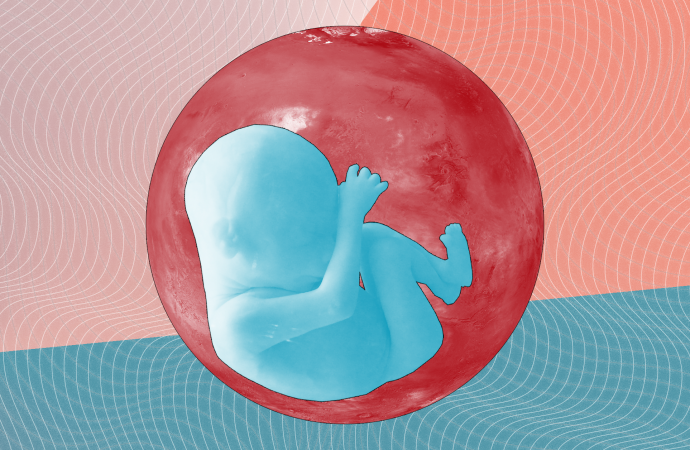How will we survive on Mars once we get there?
Having a baby on Earth? Not always fun (see: morning sickness, swollen feet, and *gulp* the actual delivery).
Having a baby on Mars, though? That might be downright impossible — unless we’re willing to rework our DNA. This news comes courtesy of a new study published in Futures by researchers from the University of Information Technology and Management in Poland.
First, let’s review the two main issues with procreation on the Red Planet:
- Radiation. Because Mars’s atmosphere is so thin, cosmic radiation poses a threat to any humans on its surface — and any human fetuses. The researchers note this could cause problems in fetal development. Settlers will also experience increased exposure to cosmic radiation during their journey to Mars, which could affect their ability to procreate. “Radiation is known to be deleterious for adults and especially for reproductive cells, developing embryos, and fetuses, and is already considered a major health hazard to astronauts,” wrote the researchers.
- Microgravity. Exposure to microgravity, both during the trip and once on the Red Planet, is another concern. We already know it can cause bone loss and affect the levels of fluids in eyes and spinal cords of astronauts, leading to vision loss.
Add in a number of other potential health issues associated with space travel — immunosuppression, nervous system changes, hearing loss — and the human body is hardly in peak condition for reproduction on Mars.
So, what are two human settlers of Mars to do if they want to start their family? They might want to tweak their DNA to be a little less “human.”
In their paper, the researchers note the possibility of using of CRISPR to genetically engineer humans to overcome these hurdles to reproduction. This would result in “speciation of Homo Sapiens,” essentially a new type of human, which opens up an entirely new set of ethical issues that the world will have to wrestle with.
Still, it’s not like we’ll be trying to make reproduction on Mars happen tomorrow. We still have plenty of time to research the potential effects of off-world living on reproduction, which is exactly what the researchers suggest we do.
They note the need for studies on the impact of reduced gravity on the production of male and female reproductive cells, as well as the gestation and delivery process. We might even want to consider attempting human reproduction on the Moon or a space station instead of the Red Planet itself.
For now, reproduction remains just one of the many issues we’ll need to deal with before Mars colonization is within our grasp. While it’s good to be prepared, perhaps we should just tackle getting a human there first.
Source: Futurism

































Leave a Comment
You must be logged in to post a comment.